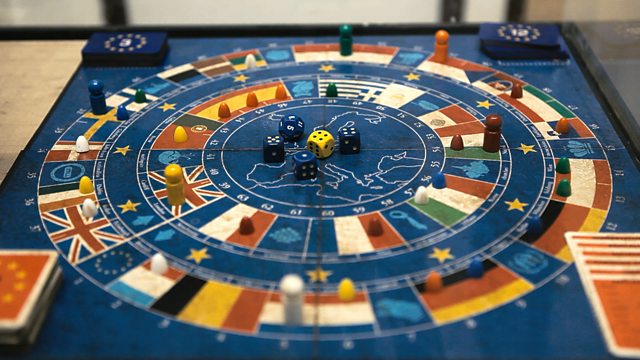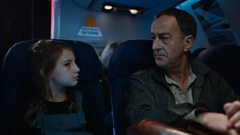
The Great European Disaster Movie
Through case studies of citizens in different countries, this film explores a range of factors that have led to the present crisis facing Europe, economic and identity challenges.
Authored documentary by Italian director Annalisa Piras and former editor of The Economist Bill Emmott, which explores the crisis facing Europe. Through case studies of citizens in different countries, the film explores a range of factors that have led to the present crisis, economic and identity challenges across Europe. High-level experts analyse how and why things are going so wrong.
The film includes fictional scenes, set in a post-EU future, which feature archaeologist Charles Granda (played by Angus Deayton) travelling on a flight through a menacing storm, explaining to a child passenger what the EU was. Sombre, thought-provoking and witty, the film frames Europe through the eyes of those who have most at stake - the Europeans themselves.
Last on
More episodes
![]()
The Great European Disaster Movie: Newsnight Debate
Robert Peston presents panel debate on issues raised in Storyville documentary on Europe
Clip
-
![]()
Conchita Wurst - European Heroine
Duration: 02:06
Annalisa Piras, director of The Great European Disaster Movie, answers the Storyville Q&A

What
is more important, story or character?
Equally
important. You can’t fly with one wing...
What
made you first want to explore the subject?
Since
studying Europe at university and then covering it as a journalist I have been
fascinated by how little many people understand the European project whilst at
the same time how much they loathe it.
How
long did it take to get the film off the ground?
One
year to get the European co-production deals together while writing and
researching the treatment. Putting the financial plan together with many different
producers was the hardest.
What
were you most surprised to learn in the course of production?
I was
puzzled that EU co-producers were equally keen to have a cross-national
perspective on Europe and at the same time tailor the film to their national
audiences.
What
have been the differences in reception to the film in countries it has now
travelled to?
The
film is yet to travel but it is meant to go on a Europe wide tour of
universities and indie cinemas followed by debates so I anticipate an
interesting travelogue.
Which
documentary has most inspired you?
Inside
Job - top level committed journalism with beautiful cinematography and gripping
storytelling.
What
is your favourite website/blog?
The
Daily Show for the best of world political satire. The Economist, The Guardian,
The New York Times.
Who
is the person you’d most like to interview, living or dead?
Silvio
Berlusconi. As far as I am aware he has never given an interview which he has
not controlled. Before he goes, I would love to film Silvio ‘uncensored’.
What’s
the best piece of filmmaking advice you’ve ever been given?
Julien
Temple on drowning in the cutting room under hundreds of hours of footage: “Get
a machete out and cut the tentacles of the algae monster that obscures the
daylight.”
Which
piece of filmmaking equipment can’t you live without?
My
smartphone and its film apps.
If
money was no object, what is your dream documentary subject?
A
history of “xxxxx” since the beginning of humanity. Give me the money and I’ll
tell you what...
What
is your favourite film of all time?
Amarcord
by Federico Fellini - visionary, poetic and sharp as a knife.
What’s
your best recent read?
Submission
by Michel Houellebecq - an unprecedented case of synchronicity between art and
news. Imagining a dystopian near future dominated by fundamentalism and then publishing
the book on the same day as the Charlie Hebdo massacre sent a shiver down the
spine of millions. Apart from Greece getting out from her debtor’s prison, I
hope we don’t live to see the dystopian Europe I imagined in my film, but can’t
be sure.
Credits
| Role | Contributor |
|---|---|
| Director | Annalisa Piras |
| Series Editor | Nick Fraser |
Broadcast
- Sun 1 Mar 2015 22:00



